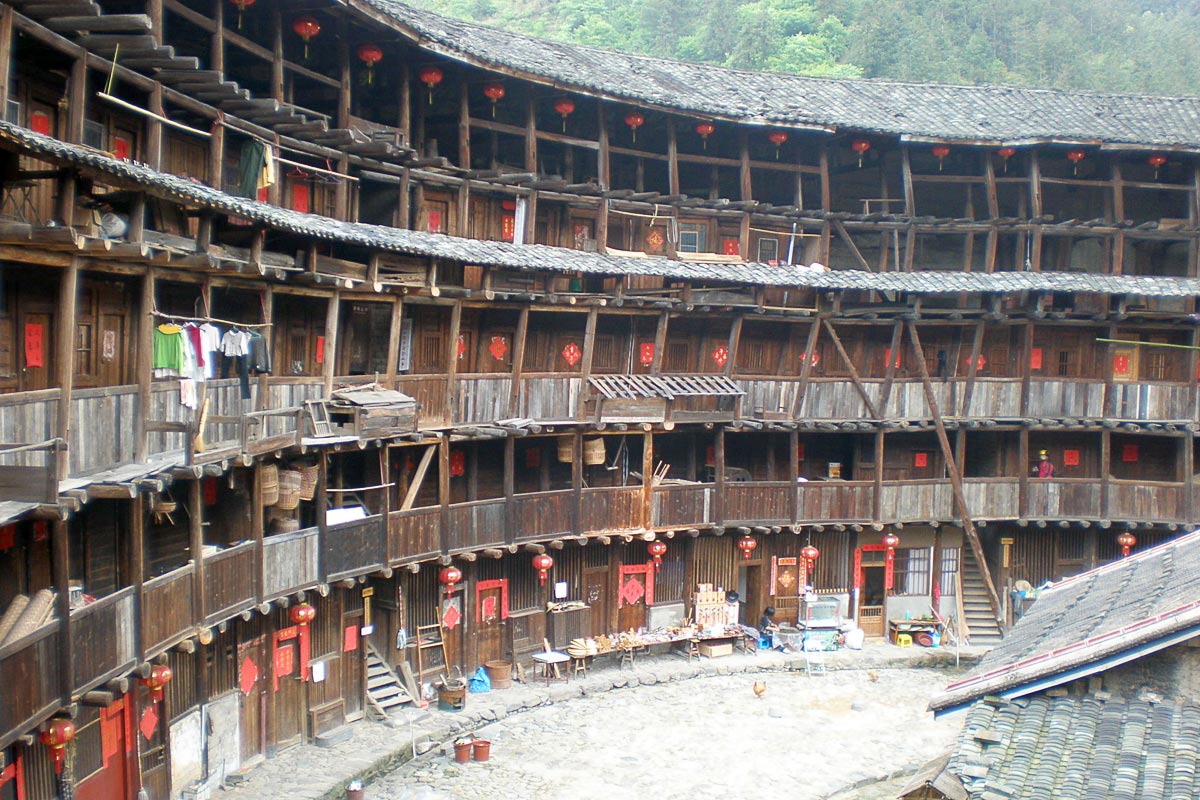
Taking from his wallet
An old schedule of trains
He'll say, "I told you when I came I was a stranger"
—Leonard Cohen
There’s a difference between relying on the kindness of strangers and imposing on people. If you’re a happily unprepared backpacking traveler, sniffing out the winds and making your own way, you’ll occasionally find yourself in a situation where you can’t continue without some input from others. If your predicament is an honest misunderstanding on your part, the travel gods will usually reward you with the aid you need.
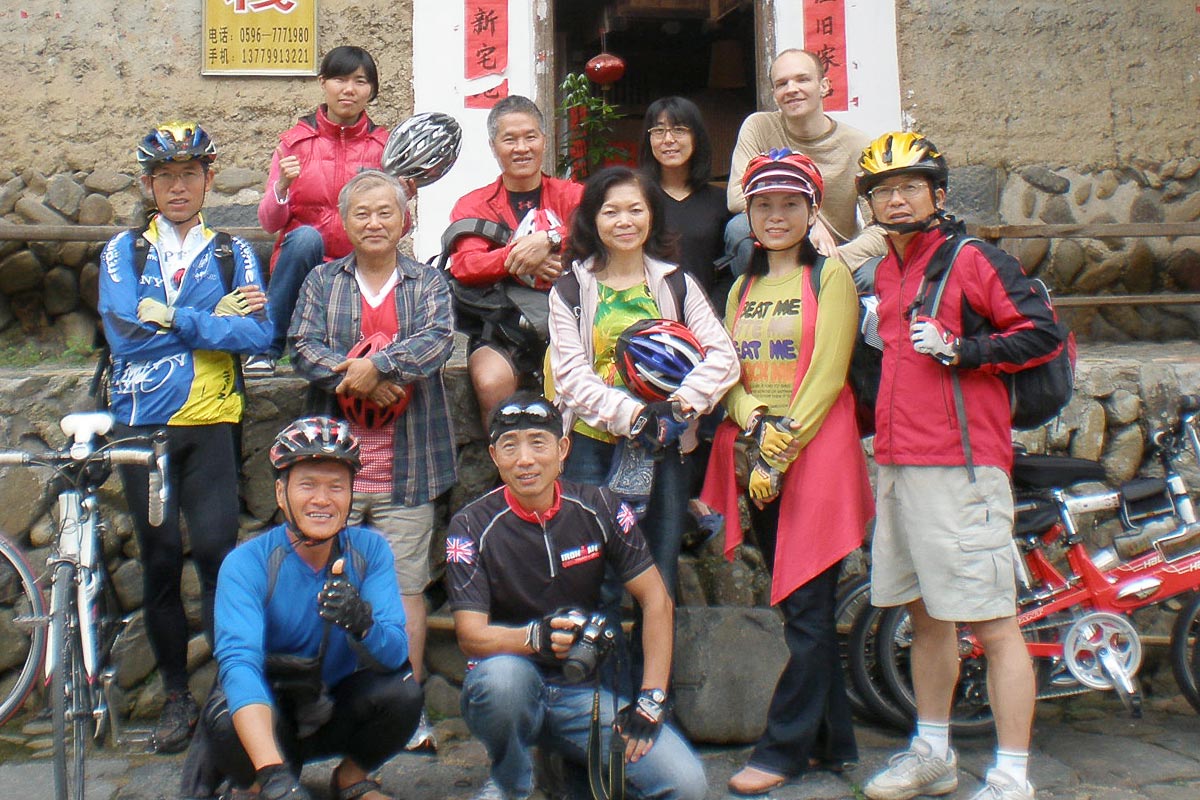
Masayo and I learned this lesson on an ill-conceived excursion to see the gigantic Fujian tulou roundhouses of southern China. We managed to get ourselves there, but found that the area was way more rural than we had imagined.
We innocently took a regular local bus from Xiamen to a stop called Tianluokeng to see the famous view of five buildings called the Tianluokeng Tulou Cluster, which I’d first seen on a Japanese magazine cover – the travel magazine that had inspired Masayo to suggest this trip to southern China in the first place.
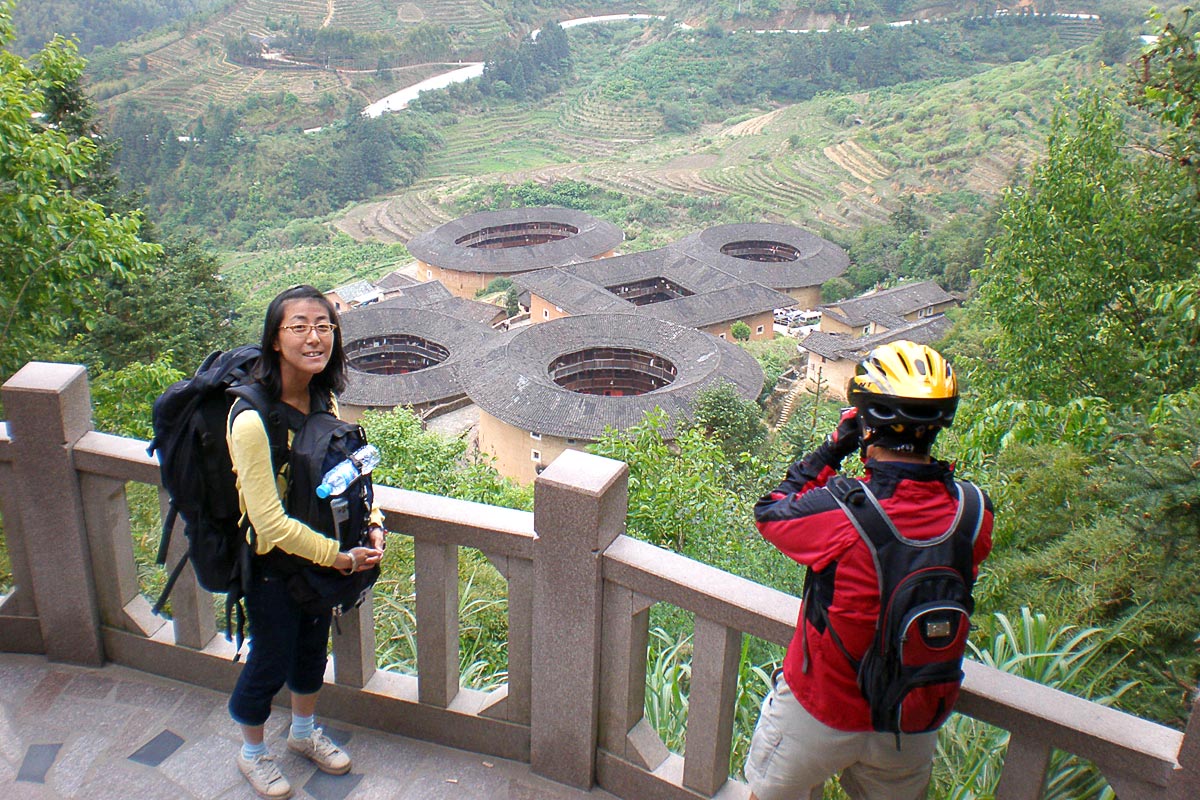
There are over 20,000 tulou (土楼) buldings in Fujian Province, and the 3,000 of them that are of the impressive Fujian type are collectively a UNESCO World Heritage Site. Arguably the most famous image of them is the five buildings that Masayo and I found ourselves near, if not quite at, when the little local bus dropped us and several other tourists off and disappeared around the corner.
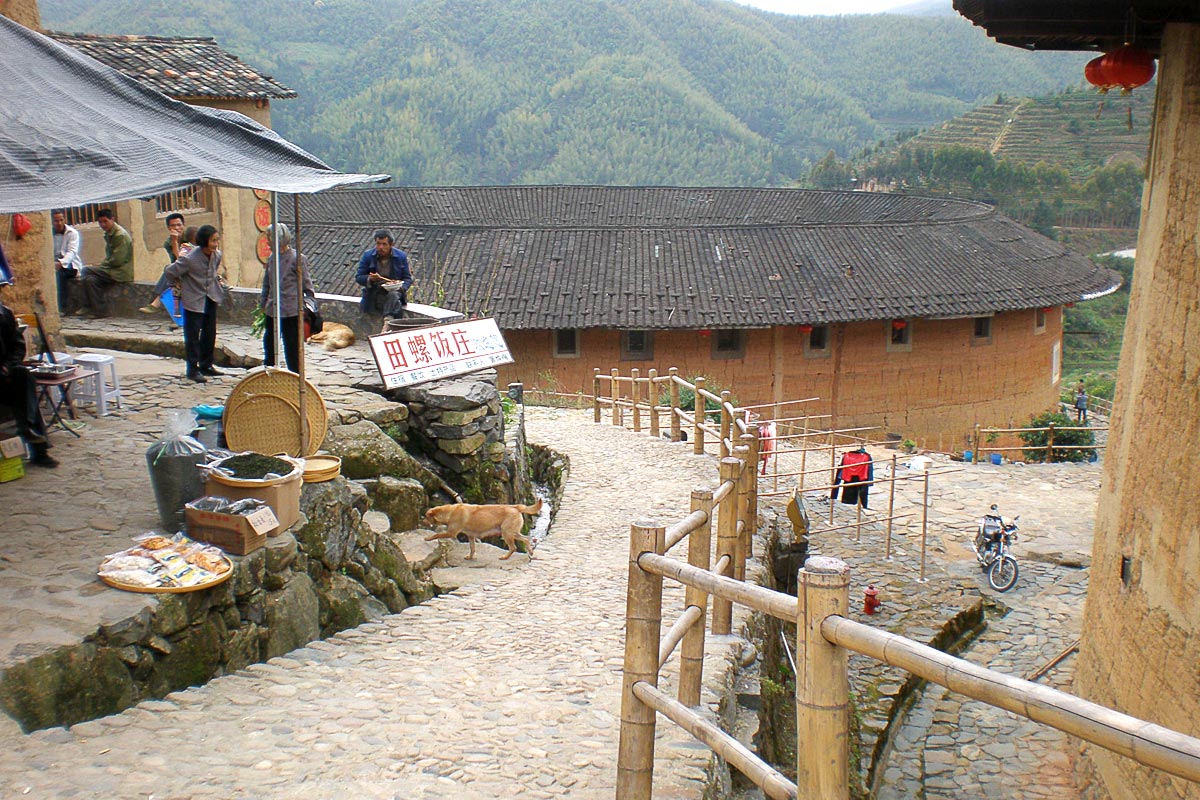
The range of guesthouses and tourist facilities we assumed would surround a UNESCO Site were nowhere to be found. The two of us stood on the side of the road wearing all our various backpacks, looking at the mountains and the trees and the winding little highway, and thought, “Well now what do we do?”
We couldn’t even go the couple of kilometers away from the bus stop to see the famous view from above. The other tourists who had been on the bus with us turned out to be members of the Chinese Taipei Triathlon Association, a Taiwanese group who had brought their own high-end-looking bicycles; now they started strapping on helmets. Bring your own transportation – how smart of them.
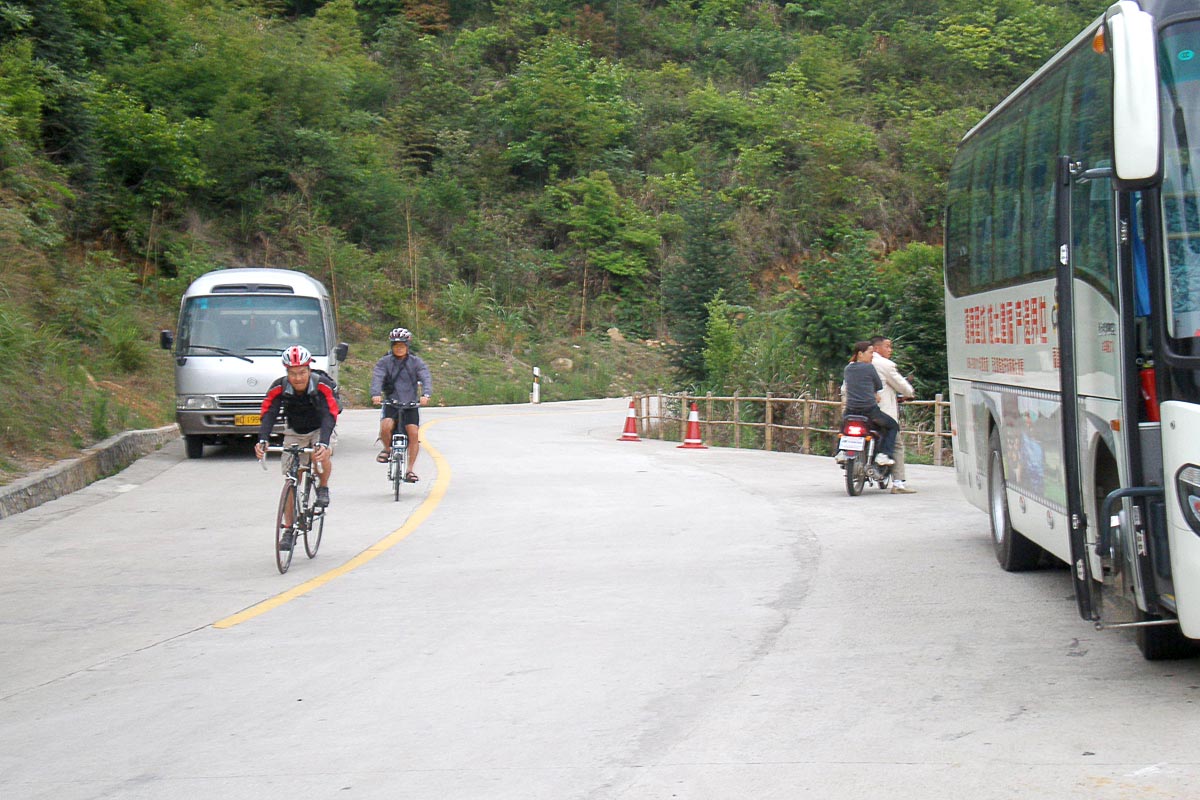
We must have looked lost, because one of them who spoke English started talking to us, and we confessed that we had no plan and no transportation. “You came here with no plans, and you don’t speak Chinese?” he asked rather incredulously. We hung our heads.
But he took pity on us, and found a guy with a motorbike who took Masayo up to the viewing platform a couple kilometers away, and then came back for me.
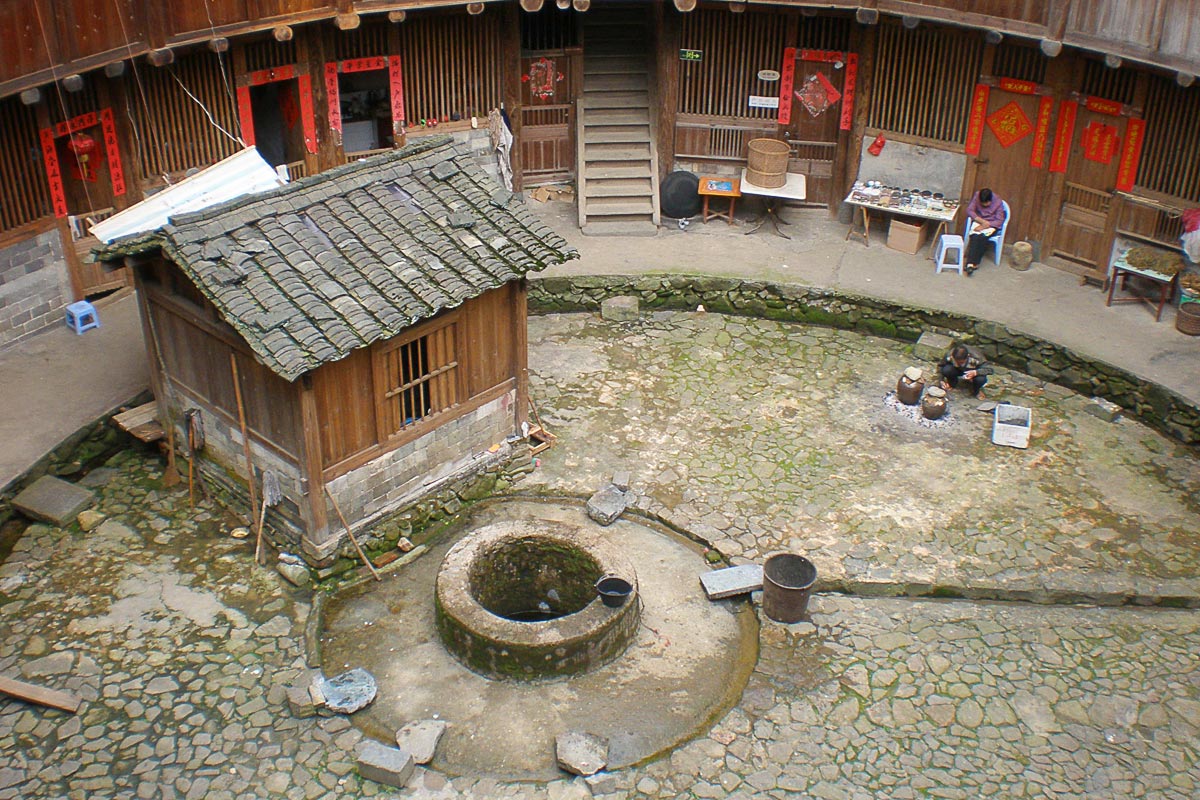
We got our photos of the tulou, which looked exactly like they had on the magazine cover. It’s always something of a thrill – a feeling of accomplishment and personal fulfillment – to see something with your own eyes that you’ve only seen in photos before.
The Taiwanese bikers who had biked up the hill were there taking their own photos. And we still had no idea what to do with ourselves. There were no buses, no shops, no hotels, no food kiosks, no nothing. Which is perhaps fair enough – the Fujian tulou have only been on the UNESCO World Heritage List less than a year. Tourist infrastructure hasn’t happened yet.
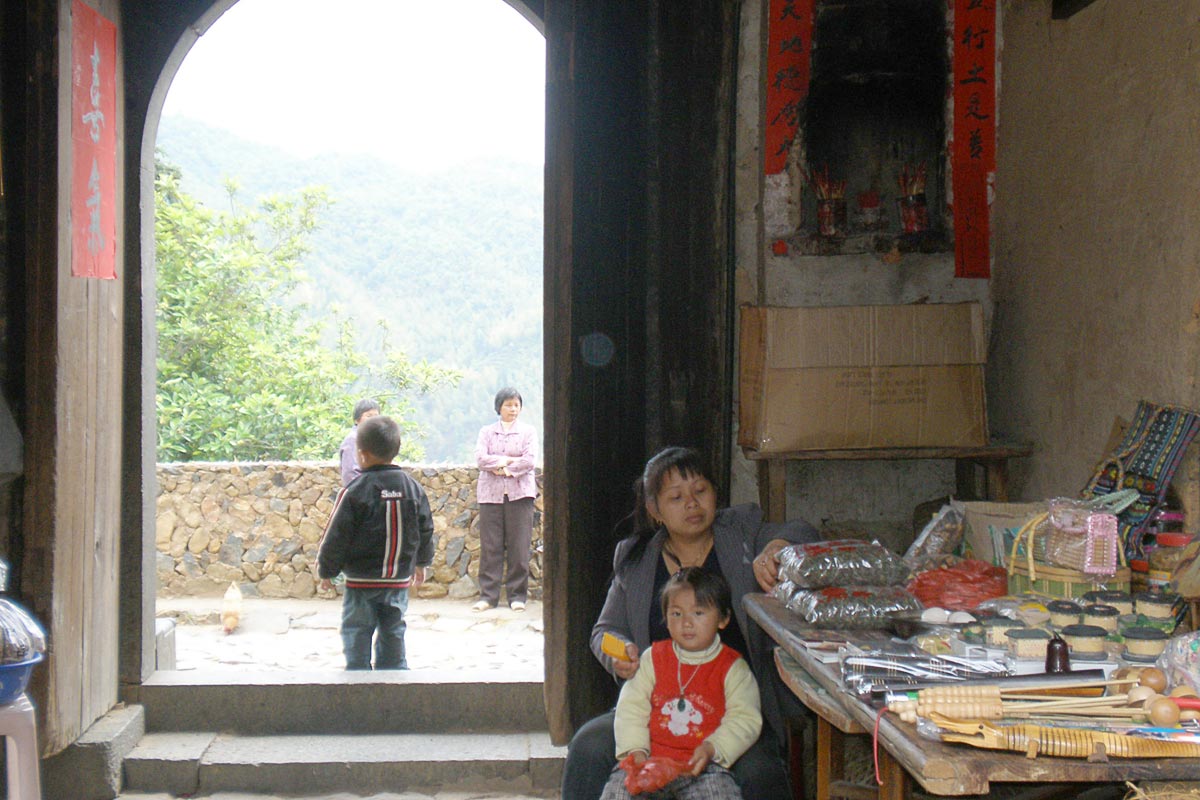
The same English-speaking cyclist said that he and his group were going down to the five-building cluster for a tour and lunch, and that we could join them. Embarrassed but grateful, we thanked our saving angel, and got motorbike rides down to the tulou village itself.
Tulou are large, usually round buildings, noted for their ingenious construction and efficient design. The Tianloukeng cluster is five round buildings full of living spaces for the community, with a square prayer building in the middle.
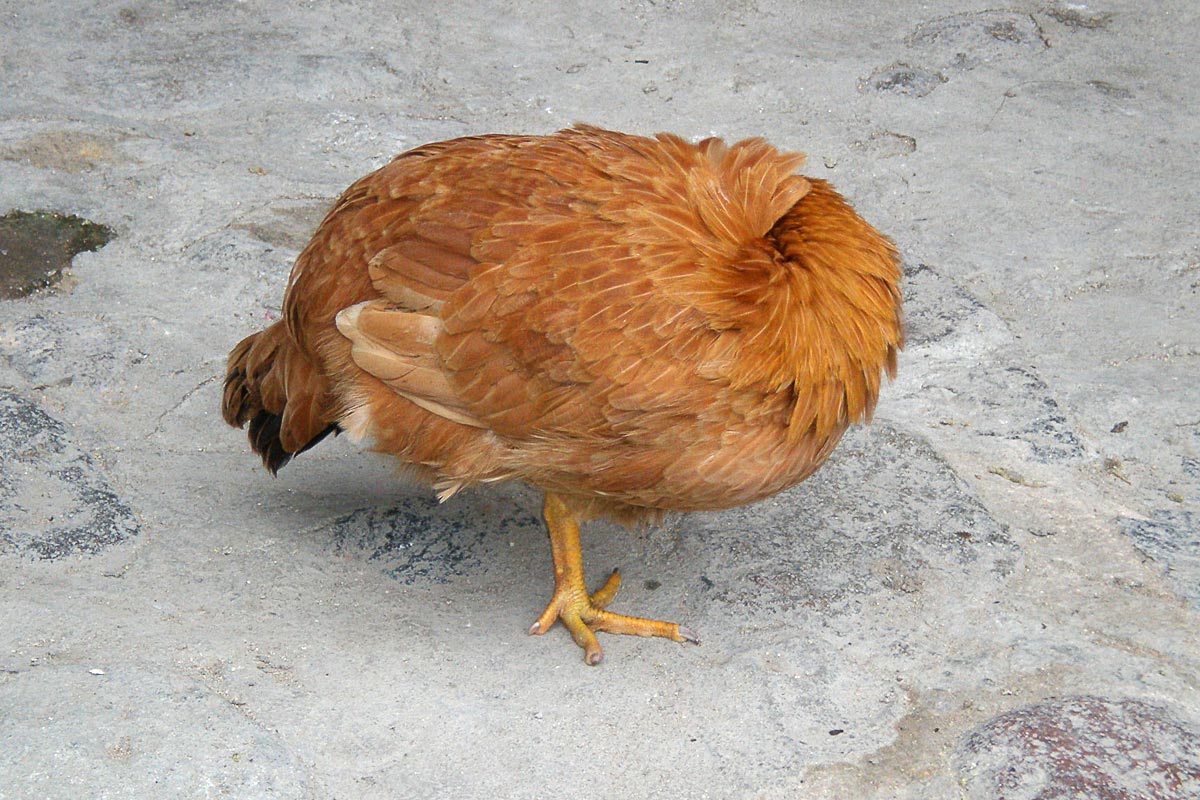
We strode around the village, with its steep, narrow dirt paths winding around the large earthen buildings. (Not all tulou are earthen, but these were.) Energetic kids and hopeful-looking dogs trotted up and down the paths.
And then it was time for lunch. A local woman caught one of the chickens that were clucking around, picking up the bright white-feathered bird and dispatching it before our eyes, plucking it in a bucket of reddening water.
Now that’s fresh meat!
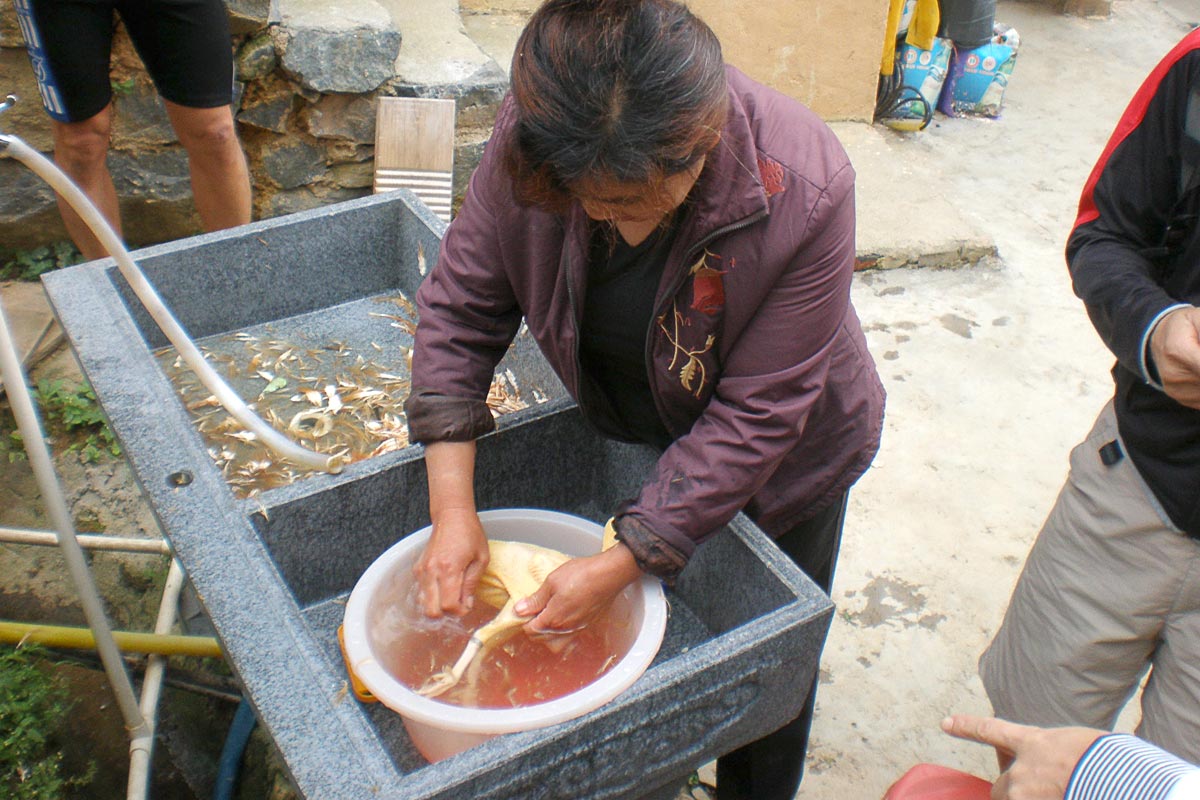
The Taiwanese tourists and Masayo and I sat at a round table and dug in. Besides the chicken soup (I had a head and a claw in mine) there was egg and bittermelon, pork, green peppers, and other things which we spun around on a glass Lazy Susan. The food was great, with a really fresh and healthy feel to it; we were both full. Not all of our companions spoke English, but that was ok; we just ate and smiled at each other.
It is with shameful regret, however, that I confess to you that I didn’t attempt to eat the chicken head or foot that was in my soup bowl. I assume they were there for flavor, anyway…? So I told myself anyway.
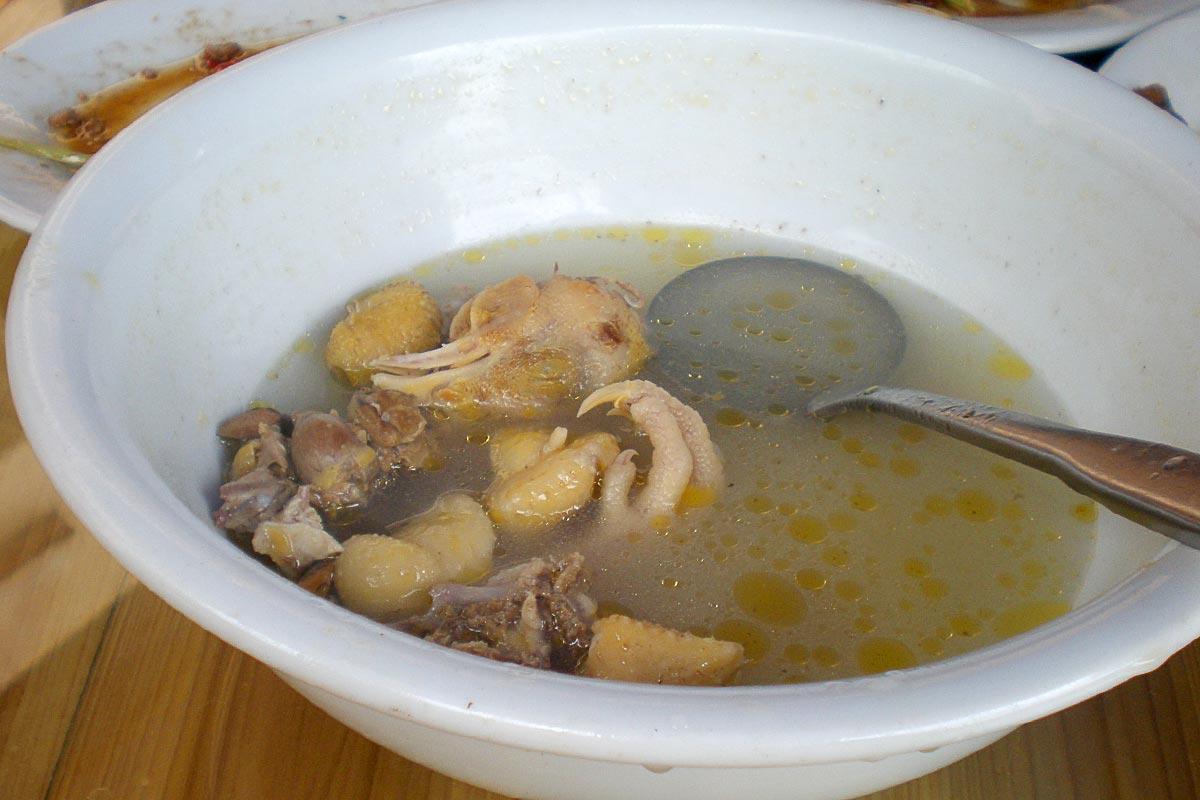
They were a mixed group that included the President and Director of their Association, plus their wives and some others. Nobody seemed to mind us being there; I was impressed with their nonchalant and open manner.
And, again, appreciative: these people had just invited us along to their pre-planned lunch, and without them what would we have done? I guess most people sign up for some kind of inclusive tour so they have something to eat and a way to get around. We had none of that; we’d just taken a local bus, gotten dropped off beside the road, and left to fend for ourselves.
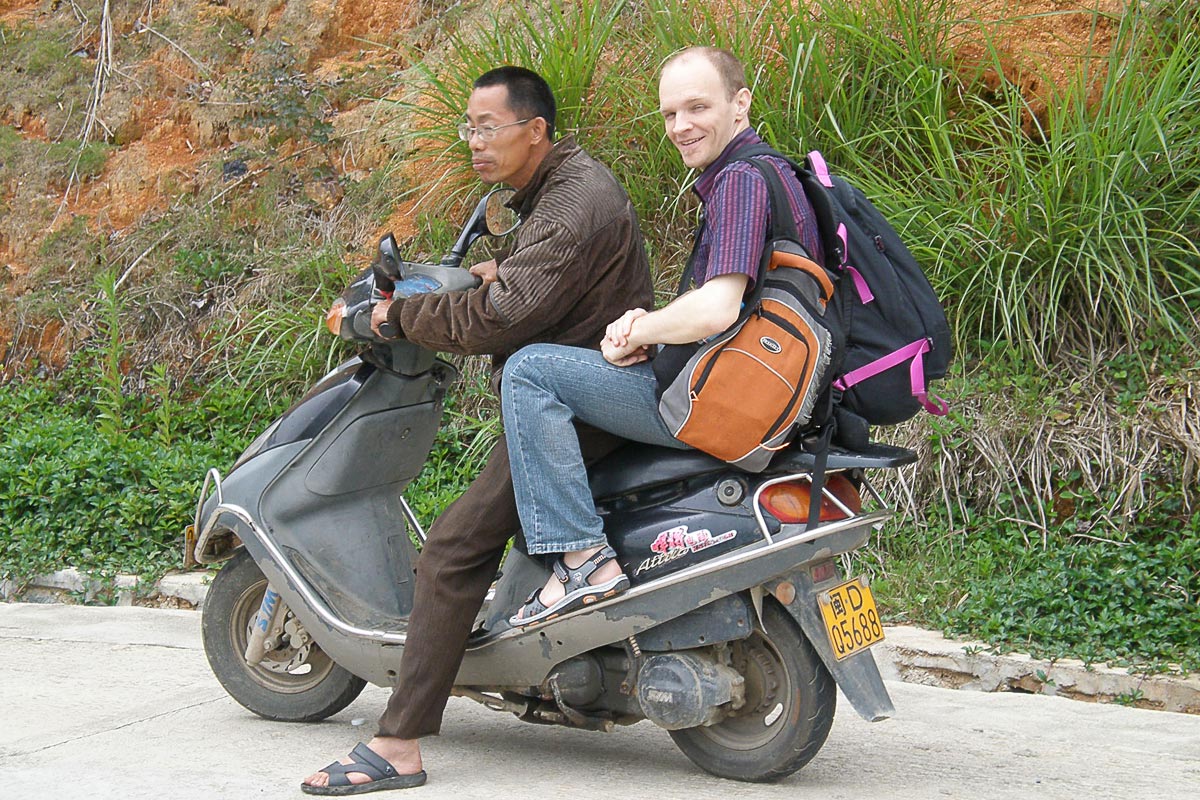
Without these triathletes none of this could have happened. I have no idea what we would have done. But, I didn’t have to think about it: the travel gods had provided the world’s kindest people for us to meet here at the tulou cluster. How lucky that we came on the same day – at the same time, on the same bus.
Diabetes report – Insulin and tulou chicken
When lunch came in the open-air patio in the Tianluokeng Tulou Cluster, it included rice, and I knew I needed to take a shot. Luckily, I take my injections from a pen into my stomach, and I was able to do it very discreetly at the table. It must have been the strangest shot of my life: in a place I couldn’t believe I was, having just watched my lunch being killed, and eating with a bunch of bike helmet-clad Taiwanese triathletes.
The travel gods have interesting things in store for you and your diabetes, if you’ll just go forth and make your way through the world.
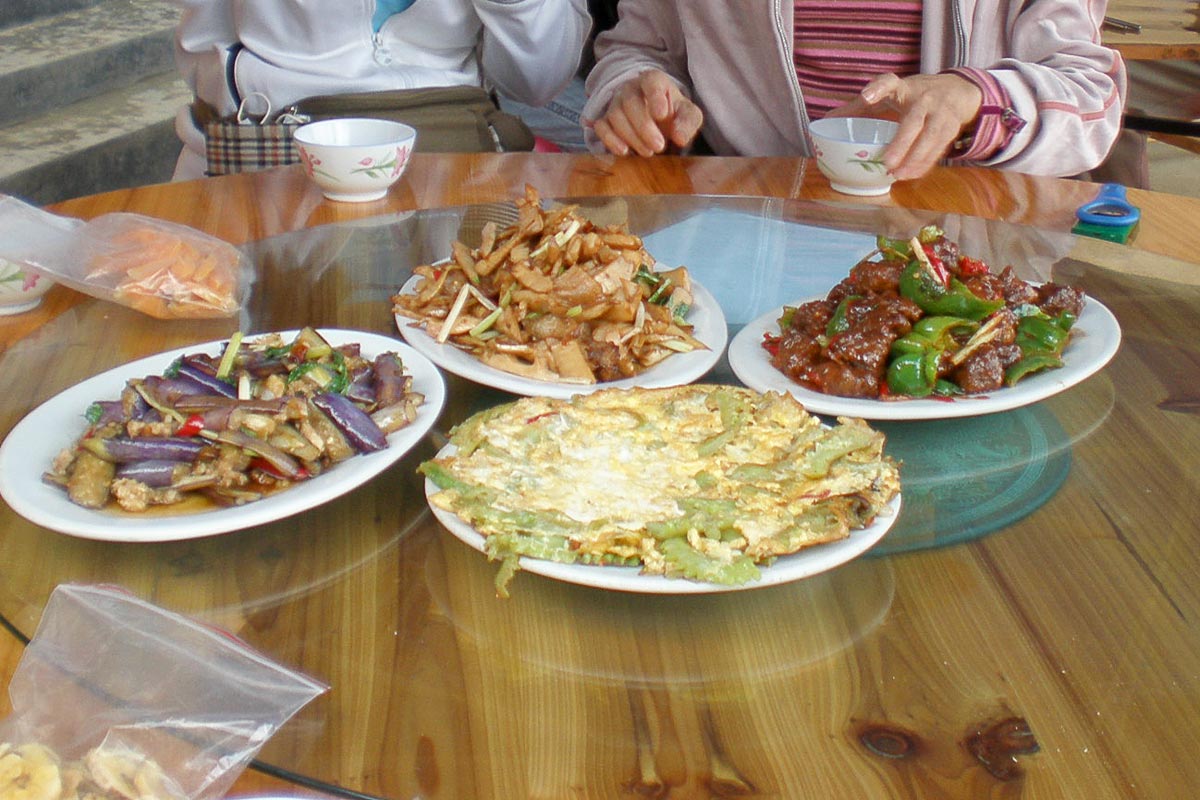
After lunch we were yet again at loose ends. The Taiwanese were going to a nearby village to stay the night and said we should come since we had no place to stay. They worked out motorbike rides for us to the community of Taxiacun (塔下村).
My motorbike driver seemed like a friendly enough guy but had the worst breath in the world (I don’t mean to complain, but it was genuinely a difficult ride for me because of it). And he was just some local who happened to be there and had a motorbike, but Masayo’s driver was in fact the young owner of the guesthouse in Taxiacun.
Things were coming together.
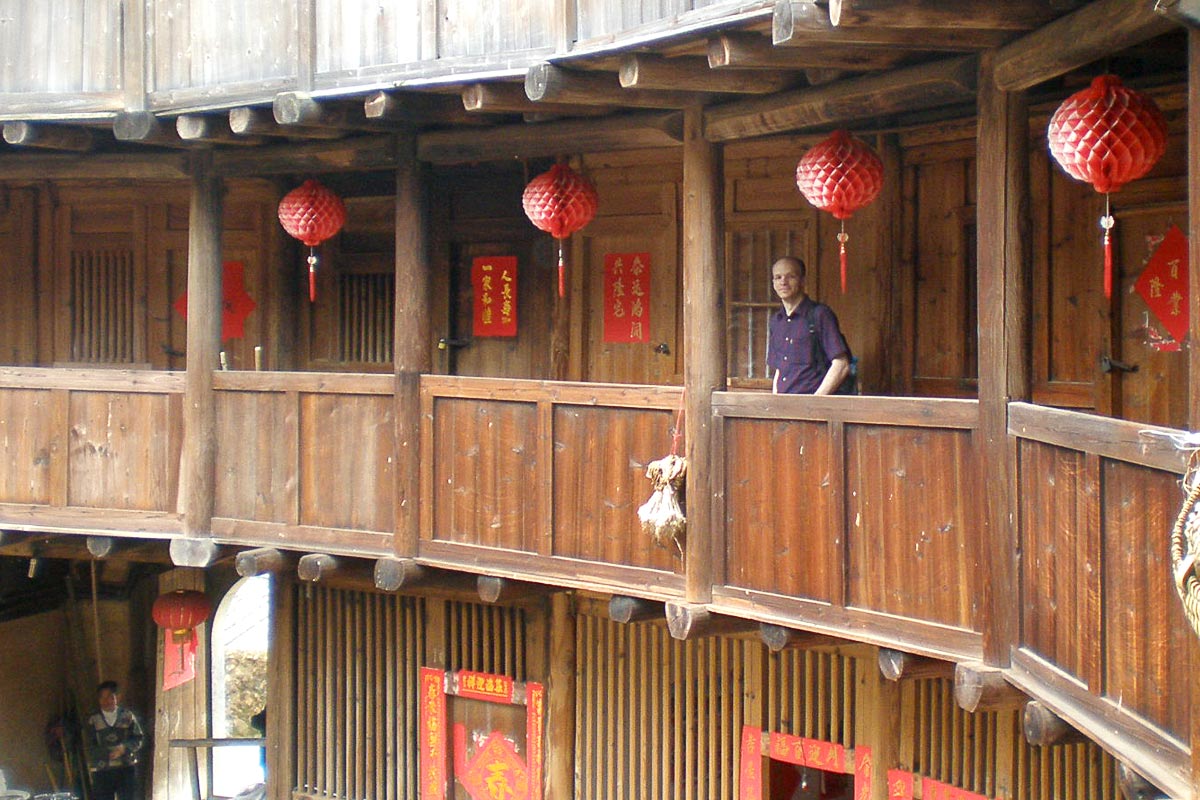
Taxiacun has some tulou of its own right in town, which is an impossibly picturesque row of wooden buildings along a winding stream that flows over dark rocks in the middle of town. Narrow streets wind right alongside it, and several bridges span the creek to allow people to get back and forth. It almost felt like you could scoop the whole town up in your arms, if it weren’t for the heavy air of immovability given off by the weathered look of the large old buildings.
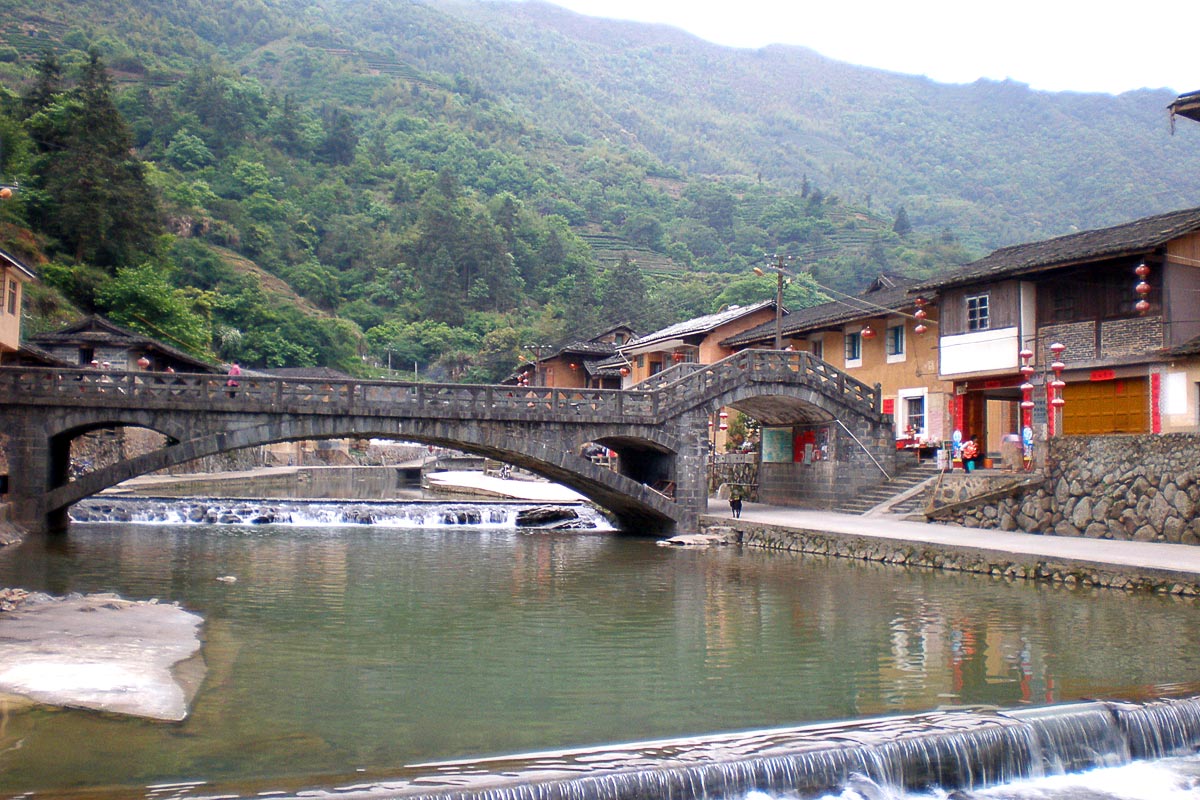
Somewhat stunned to be in such a private and obscure place in the misty mountains of southern China, Masayo and I checked into the guesthouse which itself was styled like a square tulou: rooms were on the second floor, the walkway of which looked down on the first floor which had a lounge area in the middle underneath an open ceiling. It was nice to finally be able to put down our heavy backpacks, which we’d had to lug around all afternoon.
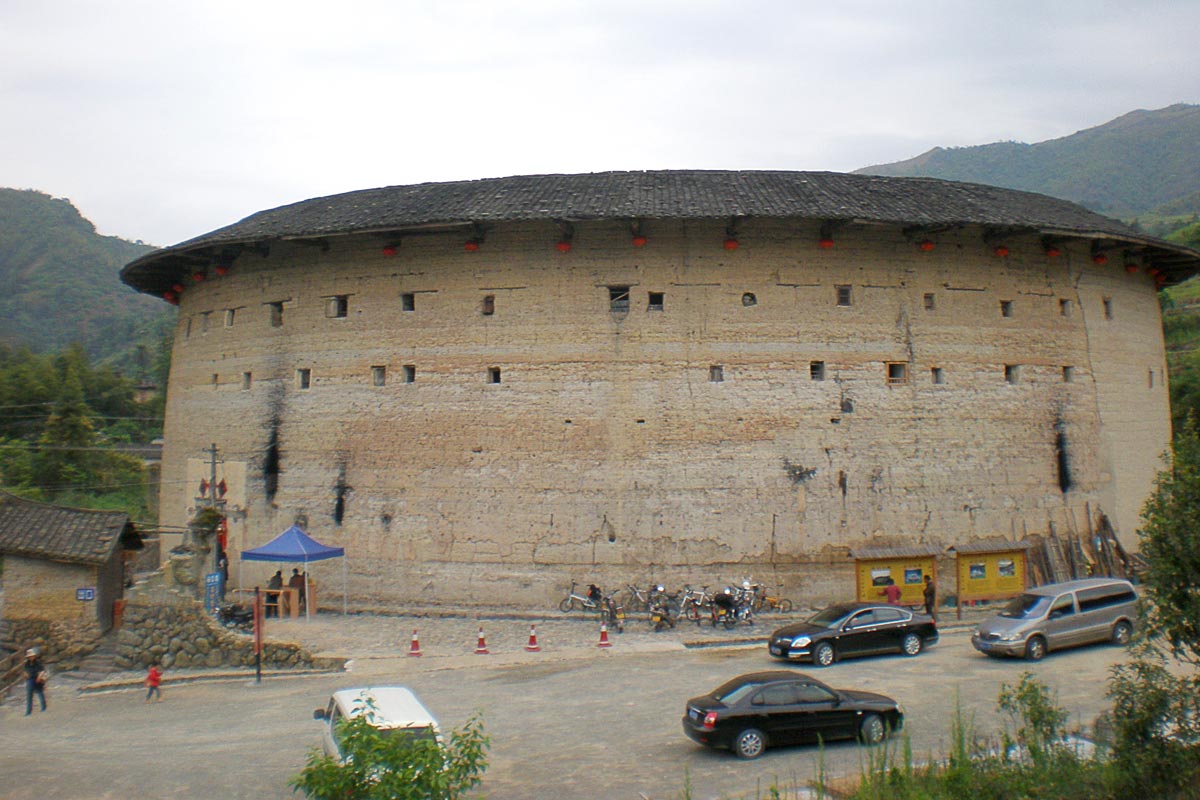
A tulou in the town of Taxiacun.
When the people you meet are as nice as the ones we mercifully ran into today, it can make you self-conscious about the scope of your needs. But at some point you have to just accept it, and decide that you would do the same thing if the situation were reversed – karma is real and you must do your part.
And, with the crazy way we ended up in Taxiacun, a place that nobody has ever heard of, the world’s most beautiful town in a forgotten corner of China, this has been a perfect day of travel. The kindness of strangers led to riches we could never have found on our own.
Travel really is magical.
What kind help have you received from strangers while traveling?
Thanks for reading. Suggested:
- Share:
- Read next: Day 49: Tea leaves and local families in Taxiacun
- News: Newsletter (posted for free on Patreon every week)
- Support: Patreon (watch extended, ad-free videos and get other perks)

Support independent travel content
You can support my work via Patreon. Get early links to new videos, shout-outs in my videos, and other perks for as little as $1/month.
Your support helps me make more videos and bring you travels from interesting and lesser-known places. Join us! See details, perks, and support tiers at patreon.com/t1dwanderer. Thanks!
